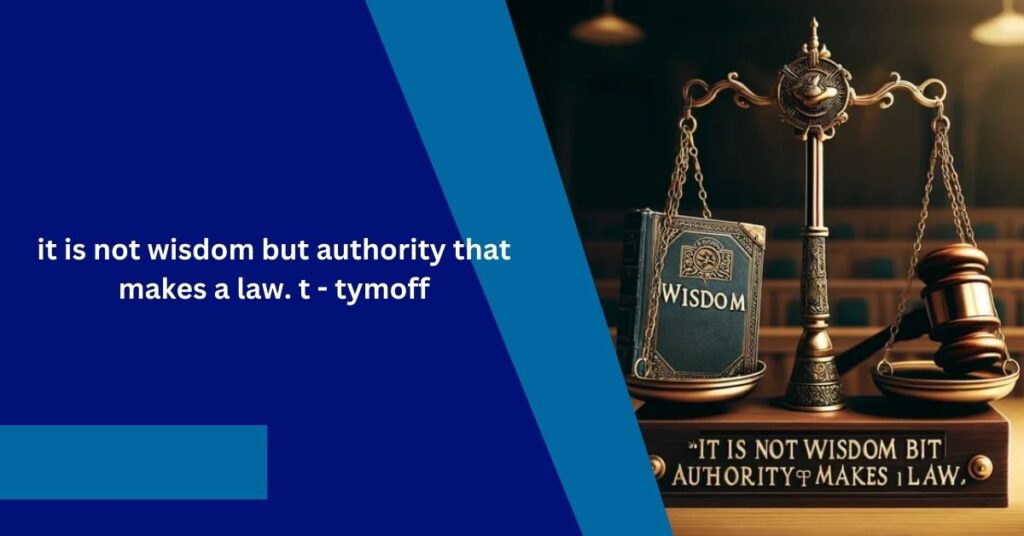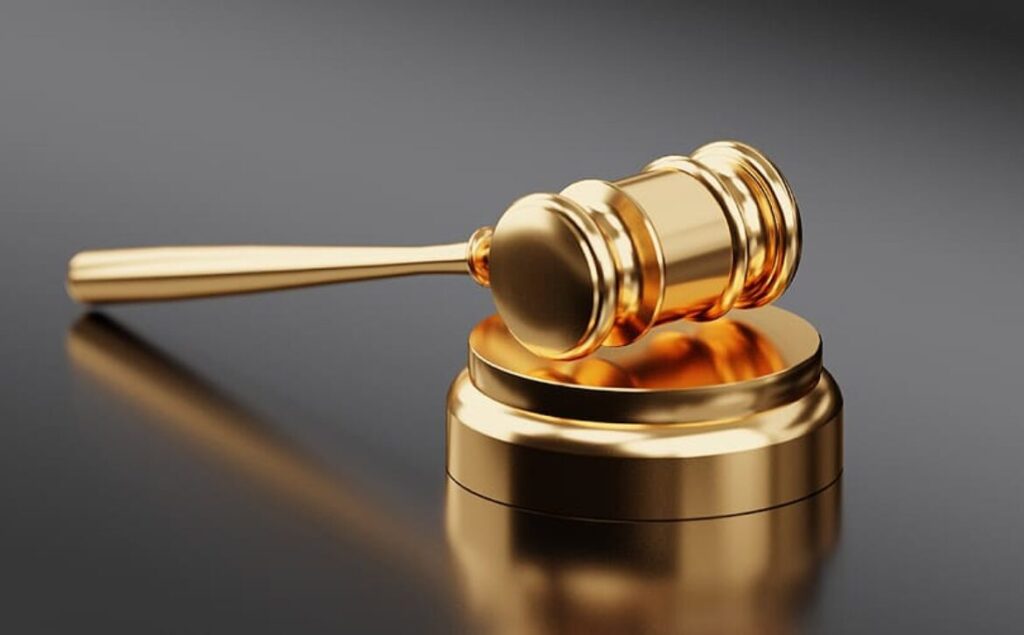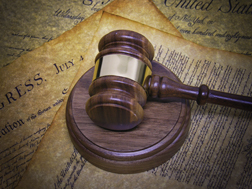it is not wisdom but authority that makes a law. t – tymoff

Laws shape the structure of societies and provide the framework that ensures justice, order, and the protection of individual rights. Yet, the proper foundation of laws has been a subject of intense philosophical debate. One quote encapsulates this conflict: “It is not wisdom but authority that makes a law” by Tymoff. At first glance, this statement suggests a paradox: are laws truly shaped by wisdom, or is the sheer force of authority ultimately defining them?
This article delves into the tension between wisdom and authority in lawmaking. Exploring historical and contemporary examples will uncover how authority often supersedes wisdom in creating and enforcing laws. Through an in-depth examination, this article aims to provide a deeper understanding of how Tymoff’s perspective applies to modern governance.
The Concept of Law – Wisdom vs. Authority:
What is Law?
Laws are not just rules; they are the foundation of any structured society, designed to maintain order, safeguard rights, and ensure justice. They govern everything from individual behavior to collective actions. Laws offer protection, resolve disputes, and set clear guidelines for appropriate conduct. They are mechanisms for fostering peace at their core, but their creation and enforcement depend on complex governance systems.
The most basic role of law is to provide stability. A functioning society needs reliable systems that prevent chaos and ensure that citizens can predict the consequences of their actions. Law maintains this order, but the question remains: who should have the power to create and enforce it? Is it the wise or those with authority?
Tymoff’s Quote: A Philosophical Foundation:
Tymoff’s assertion, “It is not wisdom but authority that makes a law,” invites deep philosophical reflection. It suggests that authority, rather than wisdom or moral reasoning, holds the primary power in shaping laws. While wisdom may guide an ideal system, the authority of political leaders, rulers, and governments enacts the laws that regulate society.
In this context, wisdom refers to knowledge gained from experience, moral judgment, and fairness. In contrast, authority is the right or power to command obedience and enforce decisions, often without moral justification. This dichotomy presents a fundamental conflict that lies at the heart of lawmaking.
Historical Evolution of Law – Power Over Wisdom!

Ancient Legal Systems: Authority in Action
- In ancient civilizations like Mesopotamia and Egypt, rulers often established laws to maintain control, not necessarily to promote fairness.
- The Code of Hammurabi is one of the earliest legal codes that reflect this principle. It was created by King Hammurabi of Babylon and focused more on preserving authority than creating just laws.
- Though some laws in the code might seem fair, the primary goal was to enforce the king’s power and prevent rebellion. This highlights how authority shaped lawmaking long before wisdom was a factor.
Roman Law: Authority Meets Wisdom
- Roman law is a more intricate example where authority was dominant, but wisdom also influenced its development.
- The Twelve Tables, the foundation of Roman law, were crafted by the ruling class to solidify their authority while gradually incorporating principles of justice and fairness.
- Emperors like Augustus wielded significant power to shape and enforce laws, often prioritizing the strength of the state over moral or ethical considerations, though justice evolved with time.
Medieval and Feudal Law: Divine Right of Kings
- During the Middle Ages, monarchs ruled under the belief of the divine right of kings—a notion that their authority to govern came directly from God.
- Feudal laws were enacted to maintain the status quo of power, often protecting the nobility and church while mainly disregarding the needs of ordinary people.
- Even if some monarchs were wise rulers, their absolute authority meant that lawmaking was more about maintaining control and stability than seeking justice for the people.
The Role of Authority in Modern Legal Systems:
Democratic Systems: The Balance Between Wisdom and Authority
In modern democratic systems, the relationship between wisdom and authority is anything but straightforward. While the core idea behind democracy is that laws should be fair and authoritative, the legislative process is often influenced more by political forces and powerful interest groups than by moral reasoning or public benefit.
Elected officials can create laws, and democratic institutions are designed to reflect the people’s will. But in the real world, the reality is more complex. Political agendas, lobbying efforts, and the sway of influential corporations can skew the legislative process. The result? Laws that, while backed by the authority of elected representatives, may lack the fairness or wisdom that one would expect from a system grounded in democratic principles.
Take the example of the U.S. tax system. Taxes should be used to fund public services and promote social welfare. However, in many cases, tax laws have been shaped by lobbying from powerful industries, often leaving ordinary citizens at a disadvantage. Though enacted with the authority of Congress, these laws may fail to reflect the true spirit of fairness or equity that many people would consider wise.
Contemporary Case Studies: Wisdom and Authority in Action:
- US Constitution: The US Constitution is an extreme example of balancing authority with wisdom. The founding fathers considered writing a document in which a central government represents authority and understanding by the Enlightenment thinkers. The Constitution checks and balances within the system so that no government might become heavy-handed within its realms of influence, keeping knowledge and authority in harmony with each other’s scope.
- European Union Law: The European Union’s legal system represents a modern attempt to blend wisdom with authority. Elected representatives make EU laws, but understanding human rights principles, environmental concerns, and other ethical considerations often influences their creation.
Challenges in Modern Governance:
Despite efforts to strike a balance, modern legal systems still struggle with issues where authority overwhelms wisdom. Political agendas and special interest groups often drive the creation of laws, resulting in policies that favor certain groups over others.
For example, gun control laws in the United States are a contentious issue where the political power of lobbying groups often leads to legislation that may lack the wisdom needed to protect public safety.
Read: Dejan Kacurov – A Visionary in AI and Sustainable Technology!
The Moral and Ethical Implications of Lawmaking:

When Authority Outweighs Wisdom:
When authority creates laws without considering wisdom, it often leads to injustice. For example, segregation laws in the U.S. were enforced through authority, but they lacked moral reasoning, causing decades of racial discrimination. Similarly, during Prohibition, laws banning alcohol were meant to reduce social issues but ended up fueling crime and corruption. These examples show how laws driven by power, not wisdom, can backfire.
Why Wisdom Matters in Lawmaking:
Laws need to be grounded in wisdom to be fair and just. Human rights laws, like those protecting freedom of speech, are a great example. They’re not just enforced because of authority; they reflect moral reasoning and a commitment to equality. The Universal Declaration of Human Rights succeeded because it was built on wisdom, ensuring that laws serve everyone, not just those in power.
Striving for the Ideal: Balancing Wisdom and Authority in Lawmaking
Historical Efforts to Balance Wisdom and Authority:
The Nuremberg Trials (Post-World War II):
- The Nuremberg Trials set a significant precedent for international law, showing how authority can be used to enforce wisdom.
- After WWII, the Allied powers came together to prosecute Nazi war criminals.
- These trials were grounded in the wisdom of international law, with the courts’ authority ensuring accountability.
- The trials helped establish the legal foundation for prosecuting crimes against humanity, blending wisdom and power to create justice.
Read: SpyDialer – Free Reverse Phone Lookup Service!
Practical Solutions for Achieving Balance:

Ensuring Lawmakers Are Both Wise and Authoritative:
A fair legal system requires more than just authority; it needs wise leaders. Lawmakers should make decisions rooted in fairness, informed judgment, and a deep understanding of society’s needs. Accountability ensures that those in power make laws that serve the people, not just those in charge.
Wisdom comes from diverse perspectives, experts, experienced individuals, and those who understand the real impact of laws on communities. It’s about getting beyond politics and focusing on the greater good.
The Role of Civil Society in Holding Lawmakers Accountable:
- Advocacy Groups: These groups champion the voices of the marginalized, ensuring laws address real societal issues. Without them, many would remain unheard.
- The Media: Journalists expose injustices and flaws in existing laws and push for reforms that reflect the needs of all people.
- Public Engagement: Citizens must stay involved. Voting, participating in discussions, and holding leaders accountable are essential to ensure fair and just laws.
Promoting Education and Civic Engagement:
Educating the public on the importance of laws and government decisions helps maintain a balanced legal system. When people understand how laws impact them, they’re better equipped to challenge the ones that don’t serve their best interests. Civic education empowers citizens to demand change and hold their lawmakers to a higher standard.
Checks and Balances: The Foundation of Fair Governance
The U.S. system of checks and balances ensures that every branch of government becomes equal. This system maintains the balance between wisdom and authority, requiring laws to undergo careful deliberation and accountability.
By having separate branches (executive, legislative, and judicial) oversee each other, we prevent the creation of laws driven solely by authority. Instead, laws must be justified through thoughtful discussion and guided by public values.
Balancing Power and Accountability:
- Judicial Oversight: Courts play an important role in reviewing laws to ensure they comply with the Constitution and human rights.
- Transparency: A transparent process in lawmaking allows citizens to see how decisions are made, making lawmakers more accountable to their communities.
Contemporary Examples: Wisdom vs. Authority in the Modern World
| Topic | Example | Summary |
| Authority in Legal Systems | Authoritarian Regimes | In authoritarian countries like North Korea, laws often serve the ruling regime, not citizens. |
| Social Media Regulation | Government Control | Regulations may restrict freedoms for security reasons but can lack wisdom in protecting rights. |
Read: MyFastBroker – Your Guide to Secure, Efficient, and Insightful Crypto Trading!
FAQ’s
1. What does “It is not wisdom but authority that makes a law” mean?
This quote suggests that laws are driven by those in power rather than by wisdom. It emphasizes that authority, not wisdom, ensures laws are enacted and enforced.
2. Can laws be wise without authority?
Laws can be wise in theory, but without authority to enforce them, they have no power. Authority is crucial for ensuring that wise laws are followed and upheld.
3. How can we ensure laws are both wise and authoritative?
Balancing wisdom and authority requires democratic systems, judicial oversight, and public engagement to ensure laws are fair, effective, and enforceable.
4. What are some examples of laws created by authority but lacking wisdom?
Examples include segregation laws and Prohibition, where authority enforced laws that caused social harm without being rooted in fairness or wisdom.
5. How do modern legal systems balance authority and wisdom?
Modern systems balance authority and wisdom by using public input, judicial review, and checks and balances to create enforceable and just laws.
Conclusion
Tymoff’s words, quoted in his book “It is not wisdom but authority that makes a law,” remind us that the decision to make laws is inherently settled between power and justice. A system needs both authority and wisdom while enforcing laws to ensure that these laws are fair and just. This is important in devising legal systems that promote justice, support the cause of human rights, and serve the public good.




